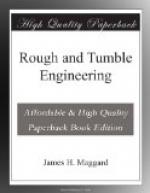Don’t open the throttle too quickly, or you may throw the drive belt off, and are also more apt to raise the water and start priming.
Don’t attempt to start the engine with the cylinder cocks closed, but make it a habit to open them when you stop; this will always insure your cylinder being free from water on starting.
Don’t talk too much while on duty.
Don’t pull the ashes out of ash pan unless you have a bucket of water handy.
Don’t start the pump when you know you have low water.
Don’t let it get low.
Don’t let your engine get dirty.
Don’t say you can’t keep it clean.
Don’t leave your engine at night till you have covered it up.
Don’t let the exhaust nozzle lime up, and don’t allow lime to collect where the water enters the boiler, or you may split a heater pipe or knock the top off of a check valve.
Don’t leave your engine in cold weather without first draining all pipes.
Don’t disconnect your engine with a leaky throttle.
Don’t allow the steam to vary more than I0 or I5 pounds while at work.
Don’t allow anyone to fool with your engine.
Don’t try any foolish experiments on your engine.
Don’t run an old boiler without first having it thoroughly tested.
Don’t stop when descending a steep grade.
Don’t pull through a stockyard without first closing the damper tight.
Don’t pull onto a strange bridge without first examining it.
Don’t run any risk on a bad bridge.
A TRACTION ENGINE ON THE ROAD
You may know all about an engine. You may be able to build one, and yet run a traction in the ditch the first jump.
It is a fact that some men never can become good operators of a traction engine, and I can’t give you the reason why any more than you can tell why one man can handle a pair of horses better than another man who has had the same advantages. And yet if you do ditch your engine a few times, don’t conclude that you can never handle a traction.
If you are going to run a traction engine I would advise you to use your best efforts to become an expert at it. For the expert will hook up to his load and get out of the neighborhood while the awkward fellow is getting his engine around ready to hook up.
The expert will line up to the separator the first time, while the other fellow will back and twist around for half an hour, and then not have a good job.
Now don’t make the fatal mistake of thinking that the fellow is an expert who jumps up on his engine and jerks the throttle open and yanks it around backward and forward, reversing with a snap, and makes it stand-up on its hind wheels.
If you want to be an expert you must begin with the throttle, therein lies the secret of the real expert. He feels the power of his engine through the throttle. He opens it just enough to do what he wants it to do. He therefore has complete control of his engine. The fellow who backs his engine up to the separator with an open throttle and must reverse it to keep from running into and breaking something, is running his engine on his muscle and is entitled to small pay.




